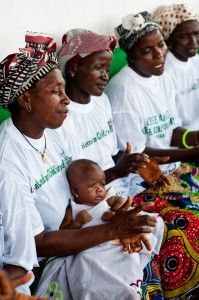
In February 2014, the impacts of a decade of development in three West African countries became challenged by what is now the largest Ebola epidemic outbreak the world has seen. What started in a remote Guinean village soon spread to bordering countries, Liberia and Sierra Leone. The result of this deadly outbreak far exceeds the loss of lives recorded as socio-economic ramifications of the Ebola virus halt day-to-day life. The Ebola outbreak has led to national quarantining of communities for up to three days at a time, economic downturn as both internal and external borders are closed, soaring food prices, and a horrific 74% death rate among health-care workers in a country that is still recovering from a decade long civil war (WHO, 2014).
CAUSE Canada has adjusted its Maternal and Child Health program objectives at this time to include focus on preventing the spread of this virus. This program takes place in Moyamba district, with a population of 278,119 and an estimated 102 Ebola cases to date (WHO, 2014). CAUSE Canada’s Maternal Child Health program has worked with Mothers’ Clubs in over 1,420 villages for the last 3 years. The goal of this program is to provide rural communities with maternal and child health services through the following ways:
Today, these Mothers’ Clubs are receiving education on Ebola prevention and supplies for hand-washing stations in an effort to help contain the spread of the virus. CAUSE Canada is also providing communities and birthing huts with additional medical supplies such as gloves, masks, and basic medicines.
Special focus must be directed towards the support and education of Mothers’ Clubs to prevent the spread of the virus among communities. Women in Sierra Leone currently account for 60% of Ebola related deaths according to Christian Aid Sierra Leone. This is due to their role as primary caregivers at home and within the community. When an individual becomes infected with Ebola and is symptomatic, the patient will spread the disease through bodily fluids. The women in Sierra Leone take care of the patient and often perform the burial rituals, putting themselves at risk, and inadvertently spreading the virus. CAUSE Canada works with Mothers’ Clubs to educate each community on ways to protect families from the Ebola virus to prevent transmission of this deadly disease.
A secondary reason for the support of Mothers’ Clubs is the estimated 3,700 children in Sierra Leone, Guinea and Liberia who have become orphaned as a result of the outbreak (UNICEF, 2014). Mothers’ Clubs as a group often take care of children that are recognized in the community as being orphaned or disadvantaged. The stigma of Ebola however, has reduced community care for orphans due to the impression that these children may be infectious. CAUSE Canada’s Ebola education program works with these communities to fully explain how Ebola is spread, and to debunk commonly held myths.
In terms of maternal and child health in Sierra Leone, more mothers are currently at risk of dying during childbirth because of the fear about contracting Ebola in hospitals and clinics. Agencies argue that there has been a huge decrease (perhaps up to 30% reduction) in the number of women attending clinics for birthing support and antenatal care. The Ebola virus will have devastating effects in all forms of development if communities do not receive education and support from field staff about the reality of this virus.
Ebola has greatly impacted the lives of people in West Africa through increasing numbers of cases and deaths. As more and more resources are allocated to Ebola prevention and treatment, there is diminished funding for on-going health challenges such as maternal and child healthcare. Increasing the capacity and knowledge of Mothers’ Clubs is an important tool to address both maternal child health issues as well as the spread of Ebola.
Published:
November 17, 2014
Author:
Laura Myers, CAUSE Canada
Categories:
SHARE THIS POST: